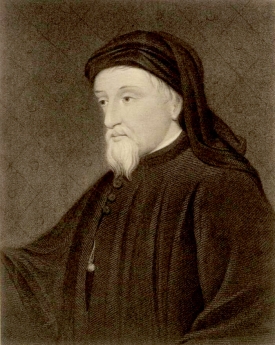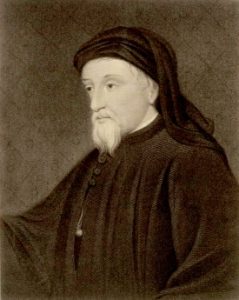Fleurs du Mal Magazine


Or see the index

Chaucer
An old man in a lodge within a park;
The chamber walls depicted all around
With portraitures of huntsman, hawk, and hound,
And the hurt deer. He listeneth to the lark,
Whose song comes with the sunshine through the dark
Of painted glass in leaden lattice bound;
He listeneth and he laugheth at the sound,
Then writeth in a book like any clerk.
He is the poet of the dawn, who wrote
The Canterbury Tales, and his old age
Made beautiful with song; and as I read
I hear the crowing cock, I hear the note
Of lark and linnet, and from every page
Rise odors of ploughed field or flowery mead.
Henry Wadsworth Longfellow
(1807–1882)
Chaucer
• fleursdumal.nl magazine
More in: Archive K-L, Archive K-L, Geoffrey Chaucer, Longfellow, Henry Wadsworth

Since I From Love
Since I from Love escaped am so fat,
I ne’er think to be in his prison ta’en;
Since I am free, I count him not a bean.
He may answer, and saye this and that;
I do no force, I speak right as I mean;
Since I from Love escaped am so fat.
Love hath my name struck out of his slat,
And he is struck out of my bookes clean,
For ever more; there is none other mean;
Since I from Love escaped am so fat.
Geoffrey Chaucer
(1343 – 1400)
Since I From Love
• fleursdumal.nl magazine
More in: Archive C-D, Archive C-D, Geoffrey Chaucer

Gentilesse
The firste stok, fader of gentilesse —
What man that desireth gentil for to be
Must folowe his trace, and alle his wittes dresse
Vertu to love and vyces for to flee.
For unto vertu longeth dignitee
And noght the revers, saufly dar I deme,
Al were he mytre, croune, or diademe.
This firste stok was ful of rightwisnesse,
Trewe of his word, sobre, pitous, and free,
Clene of his gost, and loved besinesse,
Ayeinst the vyce of slouthe, in honestee;
And, but his heir love vertu as dide he,
He is noght gentil, thogh he riche seme,
Al were he mytre, croune, or diademe.
Vyce may wel be heir to old richesse,
But ther may no man, as men may wel see,
Bequethe his heir his vertuous noblesse
(That is appropred unto no degree
But to the firste fader in magestee,
That maketh hem his heyres that him queme),
Geoffrey Chaucer
(1343 – 1400)
Gentilesse
• fleursdumal.nl magazine
More in: # Classic Poetry Archive, Archive C-D, Archive C-D, Geoffrey Chaucer

Rondel of Merciless Beauty
Your two great eyes will slay me suddenly;
Their beauty shakes me who was once serene;
Straight through my heart the wound is quick and keen.
Only your word will heal the injury
To my hurt heart, while yet the wound is clean –
Your two great eyes will slay me suddenly;
Their beauty shakes me who was once serene.
Upon my word, I tell you faithfully
Through life and after death you are my queen;
For with my death the whole truth shall be seen.
Your two great eyes will slay me suddenly;
Their beauty shakes me who was once serene;
Straight through my heart the wound is quick and keen.
Geoffrey Chaucer
(1343 – 1400)
Rondel of Merciless Beauty
• fleursdumal.nl magazine
More in: Archive C-D, Archive C-D, Geoffrey Chaucer
Thank you for reading Fleurs du Mal - magazine for art & literature